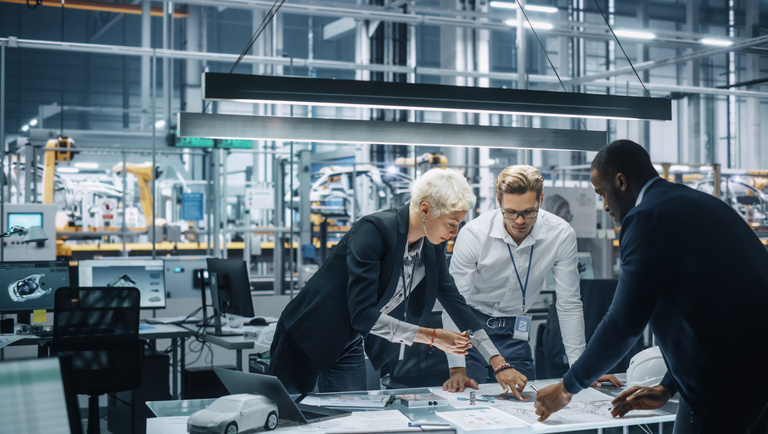
- Blog , Cloud
- Published on: 13.02.2025
- 8:07 mins
Transforming the Automotive Supply Chain: Setting New Standards with Innovative Technology
The automotive industry is undergoing a profound transformation. Globalization, technological breakthroughs, and rising customer expectations push companies to move beyond rigid structures and embrace new, digital pathways. At the heart of this transformation lies the strategic use of modern technologies.
From cloud infrastructure to blockchain and artificial intelligence (AI), digital innovations open up opportunities to enhance efficiency, increase flexibility, and meet the demands of global markets.
In this article, we explore how technological advancements are revolutionizing the automotive supply chain – and how MHP supports companies in future-proofing their supply chains.
The Evolution of the Supply Chain in the Automotive Industry
Traditional automotive supply chains followed a rigid, hierarchical model, where information flowed linearly from raw material suppliers to end customers. However, with increasing globalization and rising demands for speed, personalization, and sustainability, this model has lost its relevance.
The automotive industry has been forced to adapt: more flexible, dynamic networks are gradually replacing the rigid supply chains of the past. Geopolitical uncertainties, the growing demand for electric vehicles, and the focus on sustainable production place additional pressure on companies. These challenges require not only organizational adjustments but also profound technological transformations.
Significant Changes in the Automotive Supply Chain
Globalization has transformed the industry's supply chains into highly complex and interconnected networks. Manufacturers source components and materials from diverse regions worldwide, creating extensive global partnerships that span continents. With increasing complexity and growing pressure to operate more efficiently, companies are being challenged to fundamentally rethink their supply chains.
Automakers, in particular, focus on flexible and resilient structures that can meet the demands of a dynamic market – enabled by the strategic use of innovative technologies.
Connectivity through cross-company collaboration
Partnerships between automakers and their suppliers have become closer and more strategic. Collaborative innovation processes are increasingly being used to jointly develop new technologies, such as autonomous driving and connected mobility services.
With cloud computing and blockchain technology, manufacturers, suppliers, and distributors can access relevant data in real-time, enabling more efficient collaboration. This connectivity facilitates seamless coordination, faster decision-making, and greater transparency across the supply chain.
Process optimization
The growing pressure to operate more efficiently is driving companies to fundamentally rethink their supply chains. Modern technologies like cloud computing, the Internet of Things (IoT), artificial intelligence, and blockchain are opening up new possibilities: they enable real-time monitoring of supply processes, improve material flow, and provide comprehensive transparency across the entire value chain.
AI-driven analytics and IoT sensors offer valuable insights into the condition of machines and inventory levels. This data is centrally stored, analyzed, and made accessible via the cloud, allowing companies to plan maintenance proactively and manage inventory optimally – minimizing downtime and reducing operating costs.
The cloud acts as an enabler, allowing companies to share data worldwide in real-time and scale processes flexibly. By strategically optimizing processes, businesses gain the ability to respond quickly to changes in demand and use their resources more efficiently. The result is improved agility, which significantly strengthens their long-term competitiveness.
Enhanced data utilization
Modern supply chains are true data powerhouses, generating vast amounts of information that can be transformed into strategic advantages through the use of big data, analytics, and cloud technology. While analytics and AI interpret and process the data, the cloud provides a centralized infrastructure to store, share, and access this information in real-time across locations. This forms the foundation for end-to-end transparency and seamless collaboration along the entire value chain.
By combining cloud-based solutions with data-driven approaches, companies gain deep insights into their processes. This paves the way for innovation and enhances the agility of the supply chain. Such a flexible and data-driven infrastructure enables businesses to respond quickly and efficiently to market fluctuations, emerging challenges, and shifting demands – safeguarding their competitiveness and addressing automotive supply chain challenges in the process.
Technologies Driving Change
The automotive supply chain's digital transformation is driven by a variety of modern technologies. Their strategic implementation is crucial for ensuring efficiency, transparency, and agility in a dynamic market environment. Below is an overview of the key technologies:
Cloud computing
Cloud technologies serve as the foundation of modern supply chains. They enable real-time data exchange and promote seamless collaboration between manufacturers, suppliers, and distributors. Businesses can flexibly scale their operations and quickly adapt to changing market demands.
Additionally, the cloud provides access to powerful analytics tools, delivering deeper insights into processes and elevating data-driven decision-making to a new level.
Blockchain
Blockchain technology ensures maximum transparency and traceability within the supply chain. Every transaction is immutably recorded, enhancing trust and security. This technology is particularly indispensable in areas such as sustainability and compliance: it enables seamless documentation of the origin of raw materials and components, ensuring an ethically and environmentally responsible value chain.
Artificial intelligence and the internet of things
AI and IoT are essential drivers of efficiency and innovation. IoT sensors provide real-time data from production and logistics, while AI algorithms analyze this data to identify opportunities for optimization. This significantly enhances forecasting accuracy, inventory management, and predictive maintenance. Companies benefit from a proactive approach that minimizes downtime and makes the entire supply chain more efficient.
Greater Efficiency and Improved Collaboration Through Technology
Digitalization is transforming how companies collaborate along the supply chain. Technologies like cloud computing, blockchain, and AI enable seamless data transfer across the entire value chain – an essential step in eliminating information losses and delays traditionally caused by siloed operations.
The use of AI and IoT, in particular, opens up new possibilities: companies can detect potential disruptions early and respond proactively rather than reactively. This proactive approach enhances flexibility and strengthens the resilience of the supply chain – a critical advantage in a world full of global uncertainties.
Building a Future-Proof Supply Chain: Transforming into the Cloud
Migrating workloads to the cloud is the first critical step toward creating a future-ready supply chain. With its flexible and scalable infrastructure, the cloud provides the computational power needed for data-intensive processes.
It drives innovation, helps businesses respond to dynamic market changes, and facilitates real-time data exchange among various supply chain stakeholders. This seamless communication enhances collaboration and delivers an unprecedented level of transparency.
Without a successful cloud transformation, many technological opportunities remain untapped. The cloud is the key to implementing digital innovations and establishing the foundation for a resilient, technology-driven supply chain.
How MHP Future-Proofs Your Automotive Supply Chain
Successfully integrating modern technologies into your supply chain requires more than just the right tools. It demands extensive expertise, precisely aligned processes, and a clear change management strategy. With years of experience in the automotive industry and a deep understanding of digital transformation, MHP is here to help you tackle this challenge effectively.
We take an end-to-end approach, guiding our clients holistically – from developing tailored strategies and empowering your organization to design future-ready architectures, ensuring smooth migration, and operating modern IT systems.
MHP offers solutions specifically tailored to the automotive industry, focusing on cloud transformation, data integration, and process optimization. Our approach combines cutting-edge technology with in-depth industry expertise to make your supply chain future-ready and seamlessly integrate innovative technologies. Together, we’ll shape your digital vision.
Conclusion: The Future of the Automotive Supply Chain is Digital, Connected, and Agile
The automotive industry faces significant challenges, from global complexity and rising customer expectations to ambitious sustainability goals. Companies that actively embrace this transformation and leverage technologies like cloud computing, blockchain, AI, and IoT gain critical competitive advantages in an ever-changing world.
The cloud serves as a central enabler, allowing businesses to scale processes flexibly, analyze data in real-time, and drive innovation efficiently. This not only future-proofs supply chains but also positions them as strategic success factors.
MHP is your trusted partner on this journey, offering extensive expertise in cloud transformation and a deep understanding of the automotive industry. Together, we develop solutions that make your supply chain more efficient, transparent, and resilient.
FAQ
The automotive industry is under immense pressure, driven by globalization, technological innovations, and rising customer expectations. These developments require a departure from rigid, linear models and a shift toward flexible, connected supply chains. Only by doing so can companies respond quickly and effectively to the ever-changing demands of global markets.
Pioneering solutions such as cloud computing, blockchain, artificial intelligence (AI), and the Internet of Things (IoT) form the foundation of modern supply chains. They promote collaboration, create transparency, improve processes, and enable data-driven decision-making.
Technologies like cloud computing and blockchain enable seamless collaboration by facilitating real-time data exchange between manufacturers, suppliers, and distributors. This connectivity enhances transparency and allows companies to respond flexibly to market changes while driving innovations together.
The implementation of modern technologies is often hindered by outdated IT systems, high investment costs, and a shortage of skilled labor. To fully harness the potential of new technologies, companies must modernize their systems and invest in the continuous training of their employees to ensure efficient automotive supply chain management.
MHP offers an end-to-end approach to the digital transformation of supply chains. From developing tailored strategies and empowering organizations to design modern architectures and successfully migrating and operating digital workloads – we support you at every step. Our expertise combines innovative technologies with deep industry knowledge to make your supply chain future-proof and high-performing.




